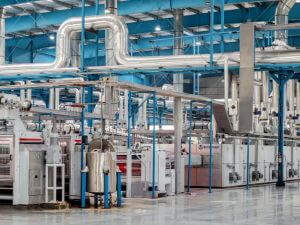Environmental Sustainability in Manufacturing
Source: Mckonly & Asbury

Over the past year, we have covered many manufacturing trends such as Industry 4.0, the economy, fraud, the skilled-labor shortage, creative labor solutions, and more. However, one topic which up until this point has not been emphasized is environmental sustainability in manufacturing. According to a recent Forbes article, sustainability is one of the top five manufacturing trends in 2023:
“With consumers increasingly showing that they care about sustainability and ethical production and are willing to base their buying decisions on it, 2023 is set to be the year where it becomes a business priority for companies as well as a matter of morals and principles.”
While the degree to which your customers are willing to base their buying decisions on your sustainability efforts varies greatly from industry to industry, the fact that environmental issues have risen to the top 5 trends warrants the attention of all manufacturers. Beyond the moral reasons to consider embracing environmental sustainability, there are several ways in which it could benefit an organization financially and operationally.
Reduce Expenses
Electricity bills in Pennsylvania have increase by an average of 73% between December 2020 and December 2022. This has led many manufacturers to begin calculating ROI on projects that are designed to reduce energy costs, such as investing in solar (taking advantage of the 30% solar tax credit), replacing old machines with energy efficient ones on the plant floor, or increasing the use of sensors and IoT technology.
Beyond the cost savings from using less electricity, companies are constantly looking to further reduce the amount of scrap from the manufacturing process. Whether it’s achieved by repurposing scrap or selling it, reducing the amount of scrap that goes into landfills helps both the environment and the bottom line.
Increase Revenue
Later this year, the Securities and Exchange Commission (SEC) is expected to finalize their new disclosure rules standardizing the climate-related impact that public companies are required to disclose. The SEC’s plans initially included a requirement for public companies to disclose information about greenhouse gas emissions from upstream and downstream activities in its value chain. If investors begin to weigh investment decisions based in part on the new climate-related disclosures, then it is reasonable to expect public companies to take a closer look at the sustainability practices of their suppliers.
While purely speculation at this point in time, it is not far-fetched to imagine a day in the not-too-distant future when government contractors will have to disclose similar climate-related information as public companies are doing now. So, whether you supply parts to a public company or provide any government contracting work, there is a chance your environmental impact could contribute to either losing revenue or gaining new business depending on your company’s willingness to embrace environmental sustainability.
Create Market Buzz
A growing number of people are concerned about the environmental impact of the products they’re connected to. This is especially true for younger generations entering the workforce. At a time when attracting and retaining labor is an enormous challenge for manufacturers, many are using their environmental accolades to create market buzz in hopes of getting more applicants. Anecdotally, I have seen this on countless websites and even during plant tours, where manufacturers proudly display certifications, awards, and infographics to show current employees, applicants, and visitors that they not only prioritize environmental sustainability but stand out from their competition with respect to innovative solutions to climate-related issues.
There are many reasons to consider increasing your emphasis on environmental sustainability. Whether you intend to broadcast your environmental initiatives or you’re simply trying to keep up with possible future reporting requirements, ultimately to get started you’ll first need to figure out which environmental metrics are most important for your company to begin tracking.
###
For more information regarding McKonly & Asbury's manufacturing experience, be sure to visit our Manufacturing Services page and don’t hesitate to reach out to a member of our manufacturing team.
